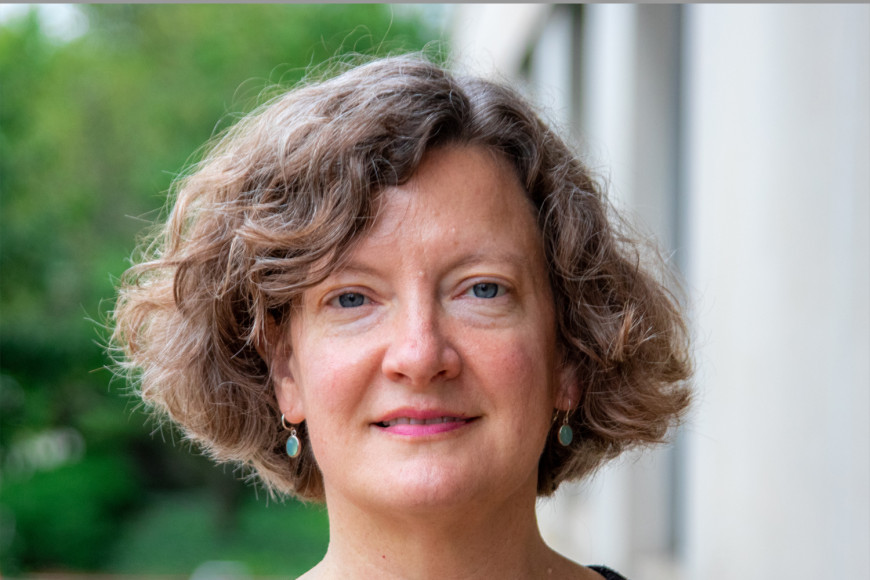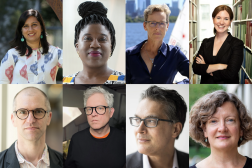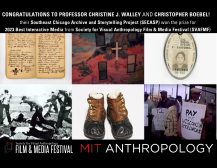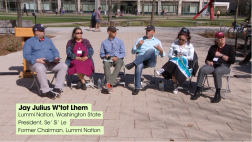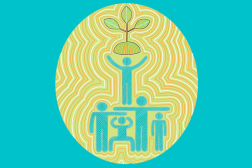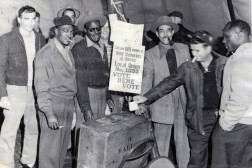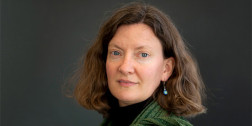Biography
Christine Walley is Professor of Anthropology at MIT. She received a Ph.D. in anthropology from New York University in 1999. Her first ethnography Rough Waters: Nature and Development in an East African Marine Park (Princeton University Press, 2004) explored environmental conflict in rural Tanzania. The Exit Zero Project used family stories from the former steel mill region of Southeast Chicago to examine the long-term impact of deindustrialization in the United States. It includes an award-winning book with University of Chicago Press (2013), as well as a documentary film made with director Chris Boebel (2017). Chris Walley and Chris Boebel have also collaborated with the Southeast Chicago Historical Museum and web designer and artist Jeff Soyk to create an interactive archive and storytelling website sechicagohistory.org. The website uses objects that Southeast Chicago residents saved and the stories they told about them to explore the transformation of what it means to be “working class” in the United States. Walley is also working on a book based on this material tentatively titled, Notes from a ‘Paraindustrial’ Age.
Research
Exit Zero Project
This project includes a book, Exit Zero: Family and Class in Postindustrial Chicago, published by University of Chicago Press (2013) as well as a documentary, Exit Zero: An Industrial Family Story (2017) made with filmmaker Chris Boebel. The book and documentary use family stories and home movies to explore the long-term impacts of deindustrialization and its role in expanding class inequalities in the United States through the lens of the former steel mill community of Southeast Chicago. The project also includes a collaboration with the all-volunteer Southeast Chicago Historical Museum. The collaboration has resulted in an online archive and storytelling site (sechicagohistory.org) that uses objects that diverse groups of residents saved, and the stories they told about them, to explore the transformation in what it means to be “working class” in the United States. The website, designed with Creative Director Jeff Soyk, was funded by the National Endowment for the Humanities, the Gaylord and Dorothy Donnelley Foundation, and MIT. Walley is currently working on a book based on the materials found in the Museum tentatively titled, Notes from a ‘Paraindustrial’ Age.
Selected Publications
| 2024 | “Bringing a Working-Class Archive Online: Multimodal Storytelling in a Postindustrial City.” (forthcoming) Anthropology Now. |
| 2024 | “Unsettling the Self: Exploring Autoethnography, Intimate Ethnography, and Ethnographic Memoir,” introductory article by Christine Walley and Denielle Elliott to special issues “Unsettling the Self” including 13 autoethnographic pieces by anthropologists, (forthcoming) American Anthropologist. Anticipated December 2024. |
| 2024 | “Living in the Paraindustrial.” In: special issue “Unsettling the Self,” (forthcoming) American Anthropologist. Anticipated December 2024. |
| 2023 | No Land to Count On. Chinese Translation of Exit Zero: Family and Class in Postindustrial Chicago. Published by Tao Zhi Yao Yao Culture Co., Ltd (TZYY), translator Yiming Zhang with Fei Yan, 307 pgs. |
| 2022 | “Telling Stories Through Saved Objects: The Southeast Chicago Archive and Storytelling Project.” Cultural Anthropology, Fieldsights, June 28, 2022. |
| 2020 | “Robots as Symbols and Anxiety over Work Loss.” Online research brief with MIT’s Taskforce on the Work of the Future |
| 2020 | “The “How to” of Working-Class Studies: Self, Stories, and Working Across Media” in The Working Class Studies Handbook, eds. Christie Launius, Tim Strangleman, and Michele Fazio. Routledge. |
| 2018 | “Trump’s Election and the White Working Class: What We Missed,” American Ethnologist 44(2):1-8. |
| 2017 | Exit Zero: An Industrial Family Story, a documentary film by Chris Boebel and Christine Walley. 90 mins. |
| 2015 | Transmedia as experimental ethnography: The Exit Zero Project, deindustrialization, and the politics of nostalgia. American Ethnologist, Vol. 42, No. 4, pp. 624-639. |
| 2013 | Exit Zero: Family and Class in Post-Industrial Chicago (University of Chicago Press, 2013). |
| 2009 | Deindustrializing Chicago: A Daughter’s Story. In: The Insecure American, eds. Hugh Gusterson and Catherine Besteman (Berkeley: University of California Press, 2009). |
| 2004 | Rough Waters: Nature and Development in an East African Marine Park (Princeton: Princeton University Press, 2004). |
| 2003 | "Our Ancestors Used to Bury Their 'Development' in the Ground": Modernity and the Meaning of Development in Tanzania’s Mafia Island Marine Park. Anthropological Quarterly 76, no. 1 (2003): 33-54. |
| 2002 | "They Scorn Us Because We are Uneducated": Power and Knowledge in a Tanzanian Marine Park. Ethnography 3, no. 3 (2002): 265-298. |
| 1997 | Searching for "Voices": Feminism, Anthropology, and the Global Debates over Female Genital Operations. Cultural Anthropology 12, no. 3 (1997): 405-438. |
Teaching
21A.550J / STS.064
DV Lab: Documenting Science Through Video and New Media
Uses documentary video making as a tool to explore everyday social worlds (including those of science and engineering), and for thinking analytically about media itself. Students make videos and engage in critical analysis. Provides students with instruction on how to communicate effectively and creatively in a visual medium, and how to articulate their own analyses of documentary images in writing and spoken word. Readings drawn from documentary film theory, anthropology, and social studies of science. Students view a wide variety of classic documentaries and explore different styles. Lab component devoted to digital video production. Includes a final video project. Students taking graduate version complete additional assignments. Limited to 12.
Video work from this class has been presented at special screenings at the MIT Museum as well as in other venues. Several videos have been posted in the DV Lab class website, http://www.dvlab.mit.edu/
21A.461
What is Capitalism?
Introduces academic debates on the nature of capitalism, drawing upon the ideas of scholars as diverse as Adam Smith and Karl Marx. Examines anthropological studies of how contemporary capitalism plays out in people's daily lives in a range of geographic and social settings, and implications for how we understand capitalism today. Settings range from Wall Street investment banks to auto assembly plants, from family businesses to consumer shopping malls. Enrollment limited.
21A.410
Environmental Struggles
Offers an international perspective on the environment. Using environmental conflict to consider the stakes that groups in various parts of the world have in nature, while also exploring how ecological and social dynamics interact and change over time, subject considers such controversial environmental issues as: nuclear contamination in Eastern Europe; genetic bioprospecting in Mexico; toxic run-off in the rural US; the Bhopal accident in India; and the impact of population growth in the Third World.
21A.120
American Dream: Exploring Class in the United States
Explores the experiences and understandings of class among Americans positioned at different points along the US social spectrum. Considers a variety of classic frameworks for analyzing social class and uses memoirs, novels and ethnographies to gain a sense of how class is experienced in daily life and how it intersects with other forms of social difference such as race and gender.
21A.429J / STS.320J
Environmental Conflict
Explores the complex interrelationships among humans and natural environments, focusing on non-western parts of the world in addition to Europe and the United States. Use of environmental conflict to draw attention to competing understandings and uses of "nature" as well as the local, national and transnational power relationships in which environmental interactions are embedded. In addition to utilizing a range of theoretical perspectives, subject draws upon a series of ethnographic case studies of environmental conflicts in various parts of the world.
Awards
| 2023 | Gaylord and Dorothy Donnelley Foundation “Broadening Narratives” grant for “Closing of Mills” and “Wetlands to Waste” storylines, Southeast Chicago Archive and Storytelling Project. |
| 2023 | Best Interactive Media Award for Southeast Chicago Archive and Storytelling Project, Society for Visual Anthropology |
| 2022 | Honorable Mention, New Directions Award, General Anthropology Division, American Anthropological Association for The Southeast Chicago Archive and Storytelling Project |
| 2022 | Studs Terkel Award for Media and Journalism from the Working Class Studies Association for The Southeast Chicago Archive and Storytelling Project w/ the Southeast Chicago Historical Museum, Chris Boebel, and Jeff Soyk. |
| 2021 | Illinois State Historical Records and Archive Board grant w/ Southeast Chicago Historical Museum |
| 2020 | Gaylord and Dorothy Donnelley Foundation grant for the Southeast Chicago Archive and Storytelling Project w/ the Southeast Chicago Historical Museum. |
| 2020 | SHASS Research Fund Award, MIT, for Haunted Brownfields: The Transformation of Being ‘Working-Class” in the United States. |
| 2019 | Keeper of the Calumet Award from the Calumet Heritage Partnership for the Exit Zero Project. Co-winner with Chris Boebel. |
| 2017 | National Endowment for the Humanities Implementation Grant for interactive website project w/ the Southeast Chicago Historical Museum. |
| 2016 | Illinois State Historical Records Grant for archival project w/ Southeast Chicago Historical Museum. |
| 2015 | Studs Terkel Award for Media and Journalism from the Working Class Studies Association for the documentary film Exit Zero: An Industrial Family Story (director, Chris Boebel; producer, Chris Walley) |
| 2014 | CLR James Book Prize from the Working Class Studies Association for Exit Zero: Family and Class in Post-Industrial Chicago (University of Chicago Press, 2013) |
| 2014 | National Endowment for the Humanities Grant (Humanities Collections and References Award) for Exit Zero website project in conjunction with the Southeast Chicago Historical Museum. Role: PI |
| 2013 | Second Place, Victor Turner Prize for Ethnographic Writing (Society for Humanistic Anthropology) for Exit Zero: Family and Class in Post-Industrial Chicago (University of Chicago Press, 2013) |
| 2012 | LEF Moving Image Documentary Grant |
News
MIT SHASS announces appointment of new heads for 2024-25
School of Humanities, Arts, and Social Sciences | MIT News
July 11, 2024
Southeast Chicago Archive and Storytelling Project announced as SVA Film & Media Festival 2023 Winner in Best Interactive Media
SVA Film Media Festival
November 15, 2023
Living Climate Futures 2022 MIT Anthro DV Lab Videos
April 21, 2023
2022 GAD New Directions Awards: Christine J. Walley wins Honorable Mention
Amercian Anthropological Association Communities | Katie Nelson
August 25, 2022
Living Climate Futures Event Shows a Holistic Way Forward in Climate Fight
article by Stephanie M. McPherson
May 2, 2022
3 Questions: An anthropologist and a filmmaker on working-class lives in Chicago
Peter Dizikes | MIT News Office
September 22, 2021
Work Of The Future | 3Q: Christine Walley on the evolving perception of robots in the US
MIT News | MIT Task Force On Work of the Future
November 23, 2020
Links
"Telling Stories Through Saved Objects: The Southeast Chicago Archive and Storytelling Project." Cultural Anthropology, Fieldsights, June 28, 2022.
Southeast Chicago Archive and Storytelling Project (SECASP) sechicagohistory.org
Living Climate Futures DV Lab video collection
"Robots as Symbols and Anxiety over Work Loss." Research Brief for MIT’s Taskforce on the Work of the Future series.
